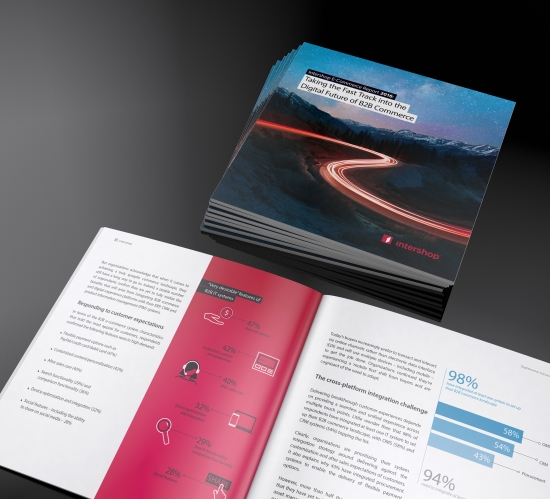4 minute read
Hi-Tech Manufacturing E-commerce Comes of Age
It’s not just factory operations that can be improved with the current focus on manufacturers embracing smart technology. Jochen Wiechen, CEO of Intershop looks at how manufacturers can also sell smarter using digital.
Digitalisation has had a big impact on sales channels. But in order to stay competitive, hi-tech manufacturing companies are being compelled to hard wire digital into wider organisational processes, systems and structures. This is one of the key findings in our 2016 research report, “Taking the fast track into the digital future of B2B commerce”.
The survey examines how the digitalisation agenda is driving change across different departments – and causing business models to evolve. Digital sales channels are no longer a sideshow. The report shows that more than four-fifths (87%) of the respondents surveyed report that their organisation has implemented a dedicated B2B e-commerce site, withone-fifthh (22%) confirming that their e-commerce store/online self-service tool is the only online sales channel on offer.
It is clear that today’s B2B hi-tech manufacturing businesses are fully embracing digital marketing and e-commerce platforms as a primary means to interact and transact with buyers.
What’s more, these organisations have proved highly successful at building out an e-commerce presence that resonates with customers. Respondents confirm that 44% of their organisation’s B2B revenue is now generated online, on average – a finding consistent across all industry sectors surveyed.
When asked which channels they plan to use to sell products and services in the next 12 months, respondents’ organisations anticipate their own e-commerce site remaining the most widely used channel (74%). However, other digital channels including B2B market places such as Alibaba (78%), social media (61%) and mobile shops (48%) are expected to increase in use over this time frame.

Jochen Wiechen, CEO of Intershop
The impact of digital on business models
The far-reaching influence of digital sales channels has had a profound business impact – over half (57%) of the respondents surveyed confirm the pursuit of digital transformation has resulted in a complete change of their organisation’s business model.
Perfecting digital sales, marketing and customer relationship initiatives that entice existing and new customers has seen end-to-end digitalisation practices creep across the enterprise. Hi-tech manufacturing companies report that 66% of their organisation is now digital and that automation practices incorporate both the supply chain (66%) and demand chain (67%).
Digitalisation has certainly impacted sales operations for all (100%) of the respondent organisations surveyed. Over half (61%) report digital has made sales more cost-effective while 30% say the sales process is more efficient. But these aren’t the only benefits being reported:
• 70% are successfully selling to customers that would not buy from them before
• Over one-third (35%) report they’ve been able to expand globally at lower risk
• Over half (52%) are generating more total sales – and more sales per representative
• Another half (52%) are leveraging digital B2B channels to persuade existing customers to purchase more items, across more product categories.
Risk and reward – an increasingly competitive digital landscape
There is a flipside to being part of an increasingly digital ecosystem. All respondents (100%) observed marketplace disruption as a result of digital technologies changing the rules of engagement:
• Over half (52%) say their sector is more global than before
• 65% say new products and services are being released with greater frequency –
as a result, their products and services can become redundant overnight
• 43% report an increase of stealth practices within their sector, with fast moving competitors and unexpected market entrants launching new products and services with little warning.
Clearly, as digitalisation lowers market entry barriers and causes long-established boundaries between sectors to tumble, competitive leapfrogging represents a strategic challenge that organisations will need to confront.
While only 35% of the respondents surveyed felt confident about the primacy of their organisation’s product offering or their ability to keep up with the effects of digitalisation, others were more confident about their ability to stay ahead of the game.
Almost all (92%) of the respondents surveyed believe that their organisation are digitalising at a faster rate than other market players.
Who’s driving the digital agenda?
Respondents confirmed that tech savvy leaders like the CEO (65%) and CIO (52%) are spearheading their organisation’s digital transformation. But it’s not just senior executives who are driving or communicating the digital vision – responsibility appears to be cascaded across organisations. Indeed, 57% of hi-tech manufacturing organisations say the IT department as a whole is one of the primary drivers of digitalisation with half (52%) saying it’s the non-C-level senior IT team that is accelerating digital adoption.
For others, however, it is senior marketing and sales management (39%) and operations management (39%) – individuals working at the sharp end who need to enable their organisation to become more agile fast – who play a leading role.
In terms of identifying which business areas which are embracing digitalisation the most, it’s perhaps no surprise that it is sales department (65%) that is leading the way along with production and manufacturing (65%).
But digital tools and processes are making an impact across the enterprise; respondents report that operations (57%), customer relations/client services (61%), stock procurement (39%) and supply chain/logistics/fleet management (43%) are all being embraced by digitalisation within their organisation.
The competitive landscape is changing rapidly and the digitalisation agenda is moving beyond simply responding to hi-tech manufacturing B2B customer expectations to conduct procurement online – it’s now about making it easier to transact and do business with. Alongside maximising process efficiency,
Hi-tech manufacturing organisations are looking to build deeper and more binding relationships by enabling the personalised delivery of products and services – at scale. The next 12-24 months look set to see further fundamental changes in business models as organisations become increasingly customer-centric.
